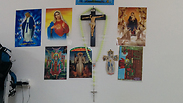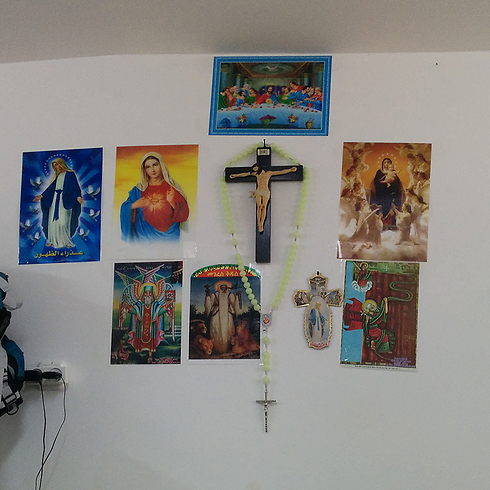
Crosses in Holot
צילום: המוקד לפליטים ולמהגרים
Asylum seeker ordered to take down pictures of crosses
The allowance of Eritrean refugee Michael Abrae, currently held in Holot, was taken away after he refused to remove pictures of crosses he had hung: 'I am deprived of religious freedom'.
"Israel has deprived me of my freedom for an unlimited period of time, and now it wants to take away my faith as well," said Michael Abrea, an Eritrean asylum seeker held in the Holot detention facility, who was asked to remove photos of crosses he had hung on his room's walls.
![]()

Abrae was indicted by the Israeli Prison Service (IPS) after refusing to take down the pictures, and his living allowance was withdrawn.
IPS officials rejected the asylum seeker's claims, saying that the facility provides freedom of religion, but bans the hanging of pictures of any kind. They added that Abrae had hung additional pictures in his room.
Along with thousands of other asylum seekers, Abrae was summoned to report to the Holot facility. According to the strict directives of the open-detention center, detainees are obligated to check-in three times a day and stay within the compoundd at night.
"I didn't want to get in trouble and I got here at the beginning of the month, as I was ordered," said Abrae, who infiltrated into Israel through the southern border in 2009.
According to the Infiltration Prevention Law that was approved by the Knesset at the end of last year, the detention at the facility in question is indefinite, and asylum seekers who are located after not reporting at a date set for them are sent for a period of 90 days to the Holot detention facility.
Related stories:
- Israel official: Africans agree to go to Uganda
- Sa'ar: More and more African migrants are leaving Israel
- Israel to trade arms for migrants with African countries
"Shortly after I arrived here, I decided to hang the pictures, but the manager told me to take them down. You are completely isolated here from the outside world and the feeling is very harsh. I don't know how long I would have to be here and I wanted to at least carry on with my traditions. The pictures of the crosses make me feel stronger."
At the conclusion of the disciplinary process, Abrae's allowance of 160 NIS ($46) for 10 days was taken away, and the IPS clarified that he would not be entitled to any money until he removes the photos.

The crosses and pictures in question (Photo: Hotline for Refugees and Migrants) (צילום: המוקד לפליטים ולמהגרים)
"I do not intend to give up," Abrae stressed, "it is my basic right."
Due to the unique status of the detention facility, which is not considered a prison, its establishment was regulated within the framework of the new law, that deals with different aspects of its operation, including welfare and health issues. However, the law does not regulate other issues, including freedom of religion within the facility.
"The decision on the matter of Abrae illustrated the huge gap between the government's attempt to present the Holot as an open facility and the reality – which is by all means a prison," said human rights attorney Asaf Weitzen of the Hotline for Migrant Workers in Tel Aviv. "The State claims that Holot provides all the needs of the detainees, but this case proves that in practice the facility violated constitutional rights."
The IPS said in response: "We respect the religious freedom of the detainees and allow them absolute freedom of worship. Alongside that, according to the facility's policy, the hanging of objects and pictures on the walls is forbidden, regardless of their content, for the purpose of marinating the facility for the benefit of the detainees themselves."










